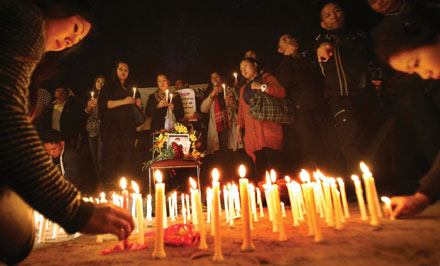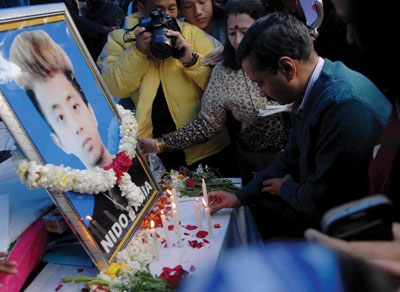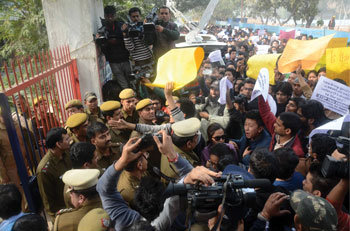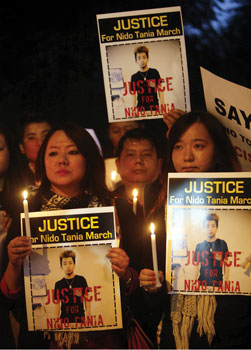Archives
Discrimeination
The bizarre incident in the country’s capital has predictably agitated many of the people from the North East region – those who are in Delhi and outside. The sitting Congress MP in Lok Sabha, Thokchom Meinya from Manipur attributed the violent death to racial profiling of people of the North East in Delhi. “The people of the North East feel alienated….Such a feeling is highly injurious to our national unity and integrity,” he said in Lok Sabha adding that even as an elected MP he faces these problems even from security guards in Parliament.

The death of Nido as an incident was hardly in isolation as earlier also, there have been incidents of people from the North East being asaulted, raped and killed. What is worse is that in most cases justice is hardly ever delivered. “New Delhi still thinks and behaves like Aurangzeb’s Delhi” is a statement often heard regarding the ill-treatment meted to North East students and the rapidly growing work force from the region – both male and female.
In various parts of the country, urban pockets like Delhi, Pune, and Bangalore, they say that North East people face ‘discrimination’ almost on an hourly and daily basis. They are refused houses and their food habits disliked. “There’s apparently a huge presence of racial profiling in the metros. It is my personal experience. Even in my own case, there arises occasions when I have to get myself identified. Even after I show my Identity Card, our security brothers, sometimes, do not appear convinced. In such a circumstance, can you just imagine the possible fallout?” Congress MP, Meinya told Eastern Panorama.
|
The Diagnosis A sitting Nagaland MP, Khekiho Sema feels that caste issues and social taboo associated with any kind of man - woman relationship as is characteristic in normal Indian life is responsible. “The taboo that looks suspiciously at two cousins walking or two colleagues discussing highlights the malady” |
The worse part is the response of the law enforcing agencies and especially the police. In fact, in 2007, the Delhi police created a flutter when it counseled North East people on what to wear and what not to eat.
“Delhi police in 2007 circulated a booklet titled ‘Security Tips for North East Students/Visitors’. Instead of solving the problems, the booklet had sparked off a series of controversies. The booklet among other issues advised girls from the North East to avoid wearing any revealing attire and urged them to avoid smelly food like dry fish and Akuni,” says Shitoli Zhimomi, a Delhi University student. The general refrain from North East people about the Government’s approach towards their problem is of either confusion or half-baked perception.

North East students and people, they say, migrate to Delhi and other cities for higher studies and jobs. One reason for the same is the lack of adequate educational and other facilities in the North East and also the absence of jobs. “It is also biological,” says Zhimomi, adding that the North East people have distinctive facial features due to their Mongoloid descent leading to problems in highly conservative hubs like Delhi. On the other hand, wrong diagnosis and typical bureaucratic responses from the Government adds to the problems.

Thus, they say that the Nido tragedy has resulted in some quick-fix actions from an otherwise indifferent Central Government, including the forming of a panel to look into the issue. This panel headed by former IAS officer M P Bezbaruah and other retired babus HWT Syiem, Alemtemshi Jamir, Tape Bagra and P Bharat Singh and S Saha (serving Deputy Secretary in the Home Ministry) has been rejected by the people of the North East. “The committee formed by the Government of India was done without consultation of any civil society group, it consists of only retired bureaucrats, with no women members and hence we reject that committee and call upon its rectification,” said D Apao from the Naga Students Association. “I agree; it will turn out to be just another ineffective body. The Government is not only clueless, they don’t even have the== will to learn,” says journalist Shivesh Garg.
Another North East watcher, Samir Purkayastha, diagnoses that ‘racial profiling’ is actually a malady of the mind and also two-way traffic. “While people of North East India complain about indiscrimination and ill treatment in Delhi and Bangalore; they have the same approach towards so called ‘outsiders’ in their own region. It is not only India-bashing, in every State there is hatred towards ‘Dwakhars’ or ‘plain manu’. The problem is actually in the environment and people’s mind,” he says.
|
A Never ending Saga It’s truly a never ending saga. In an unprecedented development, leaders of 360 khaps of Delhi’s urban villages held a meeting in Munirka village about 10 days after Nido’s death and allegedly passed a diktat calling for the eviction of tenants from the North East. Both the police and resident welfare associations in the locality however deny such resolutions. However, locals claim that many North East people especially the youth have already left Munirka.
A complaint has already been filed with the Station House Officer (SHO) of the Vasant Vihar police station. For the record, the cops say that no such decision was taken. “We were told the resident welfare associations only discussed shutting down all the shops in the area by 10.30 pm as anti-social elements come to the area and disturb the locals,” one of them said.
|
An Aizawl-based social activist on the condition of anonymity agrees to this diagnosis while adding, “In Mizoram, we had ‘vai (outsider) bashing’ almost on an annual basis and in most cases it was all part of political gimmicks. Politicians divert debate to these ethnic and community clashes to hide their corruption and failures”.
The root problem is more than often actually revolving around the ‘us and them’ syndrome. It is not only the problem of discrimination and ill-treatment when North East people are subjected to in Delhi or elsewhere. Even when it comes to boundary disputes among Northeastern States (between one state and the other) – the issues are generally seen though the ethnic, tribal and communal prism.

The Blame Game
Even in the case of Nido’s death the blame goes to the police as the cops reportedly brought back the helpless boy to the spot. “Absence of proper policing in Delhi is a serious concern,” says senior editor Harijai Singh.
On another sphere, while there is a need to improve the mutual relationship between Northeastern people even at the backyards as often Assamese or Bengalis in the region are seen in confrontation with tribal communities either Khasis or Arunachalis, a section of Delhi police says that North East people too should be a little cautious.
Recently, a group of young people from one of the Northeastern States faced embarrassment at the famous Central Park in popular Cannaught Place when they were mingling freely. “The problem is not in simple walking along; the bigger issue is the way it is done. Some of them were openly indulging in vulgar activities. Others present in the Park complained, we had to act,” a beat constable later said.

Alcoholism and drug abuse are to a certain extent common among many North East youths, especially from the moneyed families like top Government officials and netas in the backyards in the region. “Parents simply send money and hope Delhi will take care of the rest,” says one student.
In fact, many commoners in Delhi, housewives, mothers and resident welfare associations’ executives are cautious about North East people. “Why call it discrimination, we are just careful. When a problem occurs, police only advice us that we should have cross checked. We are cautious about a particular religious community and North East tribals. The antecedents of their people being involved in insurgency force us to be careful. What is wrong in this?” said one middle - aged gentleman in Dwarka locality in Delhi adding, “I don’t mind being called a conservative’.
Moreover, resident welfare associations say that while they do not discriminate, they do insist on proper police verifications or references of some Government gazetted officers. But in many cases, even such verifications do not seem to be coming. Some say even the North East community officials lately avoid giving any reference signatures. “It’s actually the chicken-and-egg story. Many North East - based working people and students are often suspected of links with insurgent outfits. The picking up of two Manipur students in 2012 for their alleged links and questioning by police alarmed everyone,” said Prakash Bhargav in East Delhi house adding that it is advisable not to give house on rent to such people. Not many can disagree to this and thus it has ruly become a never ending tale.

Police officials say though the 2007 strategy of bringing out a booklet had boomeranged and earned flak, it was not without good reason that the booklet with such advisories was brought out. “The advice of avoiding revealing dress is appreciated by most reasonable people. But people avoid endorsing the views when it comes to speaking about this in public, everyone cites equality clauses and feminism,” says one retired official adding that the ultra western style is actually a way of life in the North East but these things are not accepted even in Delhi even among the elite.
Justice – A Mirage
While the nation’s outrage on the December 16 gangrape is a much talked about phenomenon, North East watchers say that there are many cases where justice is yet to be dispensed. There are at least two cases of gang rape in moving vehicles pertaining to two Mizo women in Delhi. Two gang rape cases – one in 2005 and the other in 2010 in which both the victims were Mizo women were reported from Dhaula Kuan areas. In both the cases, the victims were abducted from Dhaula Kuan and repeatedly raped in moving vehicles. On November 24, 2010, a young BPO employee from Mizoram was kidnapped and gang raped when she was walking home after being dropped in a cab. Five men had kidnapped her and drove her towards Mangolpuri in outer Delhi, raped her on the way and then dumped her in an unconscious state. In 2005, a Delhi University student was gang-raped by four men inside a car allegedly and again dumped unconscious without clothes. The driver Ajit was convicted in December 2009 but three other accused were only declared proclaimed offenders.

